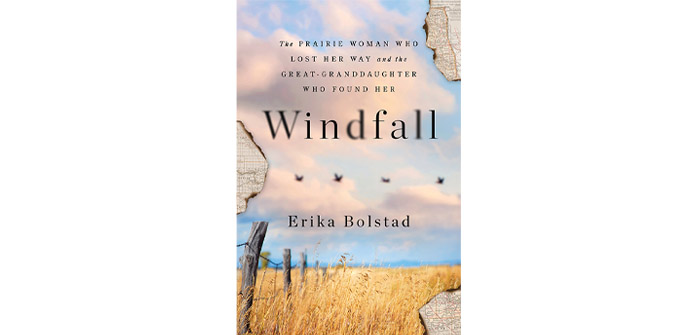(Photo courtesy of Sourcebooks, Inc.)
Windfall: The Prairie Woman Who Lost Her Way and the Great-Granddaughter Who Found Her (on sale 1/17/23) by Oregon author and Pulitzer Prize finalist journalist Erika Bolstad is the newest climate change epic, covering the sweeping plains and oil fields of the American Prairie. When Bolstad, a journalist covering climate change, suddenly inherits mineral rights, she must ask herself: What does it mean to be rich? Bolstad will have two in-person events in the Sisters/Bend area on Thursday, January 26:
- January 26 Book signing at Roundabout Books (900 NW Mt. Washington Drive, Suite 110, Bend) from 3-4pm
- January 26 Book talk at Paulina Springs Books (252 W Hood Ave., Sisters) in partnership with Pine Meadow Ranch Center for Arts & Agriculture from 6:30-7:30pm
Bolstad is also having an in-conversation event with fellow Oregonian and author Lydia Kiesling (The Golden State) at Powell’s City of Books in Portland on January 17 from 7-8pm. Bolsatad was a featured speaker on the Buzz Books Editors Panel hosted by Publishers Weekly.
About the Author:
Erika Bolstad is a journalist and filmmaker in Portland, Oregon, and the author of Windfall. Erika spent a decade in Washington, D.C., covering politics and environmental issues for Climatewire and the McClatchy Washington Bureau. In 2008, she was a Pulitzer finalist for work at the Idaho Statesman. She was also a staff writer for the Miami Herald, where she covered Hurricane Katrina and other national stories. As a journalist, she has traveled from Alaska to Miami to tell stories about the effects of climate change. Her work has appeared in The Washington Post, Scientific American and many other publications.
About the book:
After receiving a “windfall” inheritance from a family member she never knew, climate journalist Bolstad set out across the vast Bakken Oil Fields to solve a centuries old family mystery. In doing so, she reveals the devastating history of the American oil and gas industry in “engrossing” detail.
The inheritance, a $2,400 check from an oil company leasing mineral rights in rural North Dakota, stunned Bolstad and her family. Could she, a climate journalist, now be the owner of mineral rights in the crude oil-rich Bakken oil fields? Where did these mineral rights come from?
Asking that question led Bolstad to her great-grandmother, a Norwegian immigrant who settled the plains of North Dakota and purchased the rights hoping to get rich—something that never happened.
Along the way to North Dakota, Bolstad sees firsthand the devastating environmental, political, and societal effects the oil and gas industry has had on the plains and soon determines there is an even bigger mystery to uncover: Why did we let this happen?
From depictions of blue-collar North Dakotans living in their cars despite working in an industry worth over $100 billion annually, Bolstad provides an unflinching look at the greed at the heart of this industry and the oil tycoons enabling its perpetual boom and bust cycle.
Early Praise:
“Torn by her desire to know more of her family’s history, her professional understanding of the consequences of utilizing fossil fuels, and her knowledge of the financial stability the mineral rights could give her family, Bolstad headed for North Dakota’s challenging landscape.” – Oregon ArtsWatch
“Shockingly personal and brilliantly researched, Windfall is highly recommended.” – Booklist STARRED Review
The author effectively examines the political, economic, and environmental issues involved in the production of energy across the country. An engrossing look at the effects of the American oil and gas industry through the lens of family history.” – Kirkus Reviews
“In this powerful debut… [Bolstad] lucidly explains the impact of oil and gas extraction on the communities that depend on it economically. In unraveling a family mystery, Bolstad tells a much larger, richer story.” – Publishers Weekly
“With so much urgent concern over climate change and the impacts—environmental, political, economic and social—we humans have on our planet, Windfall is a timely, insightful and important read.” – BookPage
“Filled with expertly researched details… This book will appeal to readers who enjoy detailed political history books and those looking to learn a little more about the history of little discussed aspects of the Midwest.” – Library Journal

